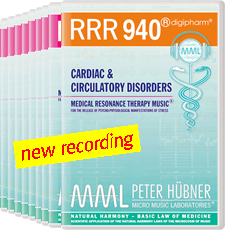| FREIE UNIVERSITÄT |
| SCIENTIFICALLY INTRODUCING UNIVERSALITY TO THE UNIVERSITY |
|
| peter huebner • micro music laboratories |
| M E D I C A L R E S O N A N C E T H E R A P Y M U S I C® |
| R E D U C T I O N O F P S Y C H O – P H Y S I O L O G I C A L M A N I F E S T A T I O N S O F S T R E S S |
Scientific Studies and Clinical Observations
- Reduction of the blood pressure in children with a tonisympathic form of vegetative angiodystonia: a positive effect was already evident by the end of the first session and had stabilized after 2 days. The general health condition improved, the number of breaths per minute changed by 1.9 breaths, the systolic vascular pressure fell an average of 6.1 mm Hg, the diastolic vascular pressure an average of 4.0 mm Hg. In the control group first improvements were evident only at the end of the first or the start of the second week
- After only 3-4 sessions there was a reduction in the heart rate in children with a tonisympathic form of vegetative angiodystonia by 5 pulse beats per minute
- Normalization of excessively high blood pressure (reduction of 15-20 mm Hg) in pregnant women with mild OPH syndrome
- Slowing of the heart rate in older people and people of middle age: from the third session on, a reduction in the heart rate averaging 5 beats per minute was evident during the relaxing music and averaging 3.1 beats per minute during the activating music
- Lowering of the blood pressure in women before and after gynecological surgery: 31% of the women with hypertonia experienced a fall in blood pressure of 15-25 mm Hg
- Reduction of the heart rate in neurodermatitis and psoriasis patients: prior to the auditory training, the mean heart rate stood at circa 85 beats per minute. After the first day of the auditory training, heart rates had fallen by an average of 5 beats per minute, and this was repeated on the third day. On the sixth day the heart rate fell by an average of 10 beats per minute. After completion of the auditory training on the fourteenth day, the average heart rate after listening was 70 beats per minute. The heart rate in the control groups did not go down
- Improvement in foetal heart activity in pregnant women with OPH syndrome: the cardiotocogram showed a normalization of the condition of the foetus in 86% of the studies. After only 6 treatments the number of accelerations and the variability had increased and treatment could be completed after 12 days. In the control group normalization first occurred after 9-10 days and the entire treatment required 14 days
- Taking of foetal heart activity out of the danger zone up to a level of 9.2 on the Krebs’ scale, which indicates a very satisfactory foetal condition
- Normalization of high blood pressure occasioned by neural dysfunction in children with a hypertonic type of neurocirculatory dystonia: Normalization of the systolic and diastolic vascular pressure, of the average vascular pressure and of the arterial pressure, normalization of the heart rate and breathing
If you want to look at the studies in detail, please visit:
